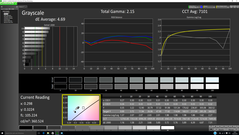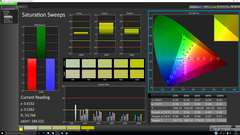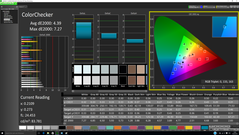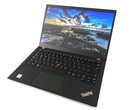Face Off: Lenovo ThinkPad X1 Carbon vs. HP EliteBook Folio 1040 G3 vs. Dell Latitude 14 E7470

Lenovo, HP, and Dell are the three biggest and most popular choices for office computers and workstations. They separate themselves from most other manufacturers by offering extensive IT and warranty services for their products to attract businesses and large-scale purchases. Thus, it's no surprise that they offer some of the best business notebooks available.
Our comparison this week focuses on the fourth generation X1 Carbon against the third generation EliteBook Folio 1040 and much more mature Latitude E7470. At 14 inches each, this size category is the middle ground between netbook-sized solutions that may be too small and larger solutions that may be too bulky.
We encourage users to check out our dedicated review pages below for more data and detailed analyses of each of the three models. This comparison is by no means a replacement, but a condensed aid for those on the fence.
Case
Case quality is very good between the notebooks as each utilizes either carbon fiber, aluminum, magnesium, or a combination thereof. The Dell notebook is exceptionally dense and is the toughest of the three in terms of rigidity and sturdiness. The HP is slightly weaker as its base can be more easily twisted while the Lenovo is comparatively weaker than its thicker ThinkPad T460s alternative. The hinges on the latter notebook tend to teeter more than the HP and Dell as well. Otherwise, all three notebook are MIL-STD 810G approved for better resistance against dust, vibrations, and other environmental factors than a standard consumer Ultrabook.
The Latitude E7470 takes this round, but not without some drawbacks worth taking into account. The Dell system is noticeably heavier and thicker than both competing models. Thus, users who prefer lighter notebooks for more comfortable use when traveling may have no problems sacrificing a little rigidity for better portability.
Winner: Dell Latitude 14 E7470
Connectivity
A healthy number of ports and options are available on each notebook considering the small screen size including SIM support, HDMI, and multiple USB 3.0 ports. There are, however, some exceptions to keep in mind. For example, the Lenovo notebook is missing a Smart card reader, the HP is missing both a SD reader and mini-DisplayPort, and both the Lenovo and Dell do not have USB Type-C ports. While all models have dedicated docking ports, we expect that these manufacturers will eventually drop these proprietary connectors for the more universal USB Type-C with Thunderbolt 3 port in future revisions. Dell, for example, has told us that it will begin phasing out its docking port as the USB Type-C port allows for thinner and lighter designs.
It's also worth noting that while the HP unit is the only model with the reversible USB port, it is only Gen. 1 and offers no performance benefits over a standard USB 3.0 Type-A port.
There is no objective winner in this category due to the many non-overlapping advantages one notebook has over the other.
Winner: Tie
| Lenovo ThinkPad X1 Carbon | HP EliteBook Folio 1040 G3 | Dell Latitude 14 E7470 | |
| USB | 3x USB 3.0 | 2x USB 3.0, 1x USB 3.0 Type-C | 3x USB 3.0 |
| Video-out | 1x HDMI 1.4, 1x mDP 1.2 | 1x HDMI | 1x HDMI, 1x mDP |
| Audio | 1x 3.5 mm combo | 1x 3.5 mm combo | 1x 3.5 mm combo |
| Other | MicroSD reader, SIM slot, OneLink+, Kensington Lock | SmartCard reader, SIM slot, Docking port, Kensington Lock | SD reader, SIM slot, SmartCard reader, Docking port, RJ45 Ethernet, Kensington Lock |
| Storage Bays | 1x M.2 | 1x M.2 | 1x M.2 |
Input Devices
The keyboards of all three notebooks offer better than average feedback and travel with the X1 Carbon being the best. Key travel here is slightly shallower than on the ThinkPad T460s, but is still deeper and crisper than on both the Folio 1040 G3 and Latitude 14 E7470. This also means that the X1 Carbon is a tad louder and with more clatter, but this is mere nitpicking. Frequent users of the Arrow keys may want to avoid the HP as its Up and Down keys are much smaller and softer than the other two.
As for the touchpads, the notebooks here diverge significantly. The Lenovo system includes both a touchpad with integrated mouse keys (clickpad) and three dedicated mouse keys right above it while the HP uses just a simple clickpad. The Dell is the best of both worlds as it includes a standard touchpad with all five dedicated mouse keys surrounding it. This setup is more accurate than the HP as users will not need to rely solely on the clickpad while granting users more options than the Lenovo. The slight downside is that the Dell touchpad is a bit smaller than on the Lenovo (10 x 5.4 cm vs. 10 x 5.8 cm). Otherwise, the touchpads on all three notebooks are smooth with the staple TrackPoint nub available on two of the models.
Winner: Keyboard -- Lenovo ThinkPad X1 Carbon
Touchpad -- Dell Latitude 14 E7470
Display
The WQHD displays on each of the three notebooks offer excellent clarity and sharpness, but there are some notable differences between them as the panels are not all identical. First, the Lenovo notebook carries the dimmer backlight while the Dell notebook can be much brighter at 380 nits. The Dell display also has the deeper black levels and subsequently higher contrast than both the Lenovo and HP. Color coverage is nearly identical between the three models at about 95 percent of sRGB.
We've also provided data from our X1 Carbon FHD SKU in the table comparison below as it is worth noting that its display backlight is almost 20 percent brighter than on the WQHD SKU without sacrificing contrast. Gamut, however, is comparatively narrower on this lower resolution SKU.
Winner: Dell Latitude 14 E7470
| Lenovo ThinkPad X1 Carbon WQHD | HP EliteBook Folio 1040 G3 | Dell Latitude 14 E7470 | |
| Size | 14-inch IPS matte | 14-inch IPS matte | 14-inch IPS glossy |
| Native Resolution | 2560 x 1440 | 2560 x 1440 | 2560 x 1440 |
| Pixel Density | 210 PPI | 210 PPI | 210 PPI |
| Panel ID | Panasonic VVX14T058J00 | AUO1136 | AUO B140QAN |
| Lenovo ThinkPad X1 Carbon 20FB-005XUS | Lenovo ThinkPad X1 Carbon 20FB003RGE | HP EliteBook Folio 1040 G3 | Dell Latitude 14 7000 Series E7470 | |
|---|---|---|---|---|
| Display | ||||
| Display P3 Coverage (%) | 58.9 | 66.7 | 67.9 | 67.2 |
| sRGB Coverage (%) | 83.1 | 94.7 | 96.8 | 95.9 |
| AdobeRGB 1998 Coverage (%) | 60.3 | 68.4 | 70 | 69.3 |
| Response Times | ||||
| Response Time Grey 50% / Grey 80% * (ms) | 47.2 ? | 44 ? | 46.4 ? | 48 ? |
| Response Time Black / White * (ms) | 27.6 ? | 24 ? | 26.4 ? | 27 ? |
| PWM Frequency (Hz) | 220 ? | |||
| Screen | ||||
| Brightness middle (cd/m²) | 321.7 | 272 | 327 | 380 |
| Brightness (cd/m²) | 301 | 268 | 316 | 354 |
| Brightness Distribution (%) | 89 | 95 | 87 | 81 |
| Black Level * (cd/m²) | 0.294 | 0.32 | 0.35 | 0.26 |
| Contrast (:1) | 1094 | 850 | 934 | 1462 |
| Colorchecker dE 2000 * | 3.96 | 2.61 | 4.39 | 3.11 |
| Colorchecker dE 2000 max. * | 6.69 | 6.43 | 7.27 | 6.73 |
| Greyscale dE 2000 * | 3.15 | 3.31 | 4.69 | 4.35 |
| Gamma | 2.34 94% | 2.35 94% | 2.15 102% | 2.37 93% |
| CCT | 7082 92% | 6360 102% | 7101 92% | 6771 96% |
| Color Space (Percent of AdobeRGB 1998) (%) | 53.8 | 63 | 62.52 | 62 |
| Color Space (Percent of sRGB) (%) | 82.7 | 95 | 96.71 | 96 |
| Total Average (Program / Settings) |
* ... smaller is better
Performance
CPU Performance
Lenovo, HP, and Dell all offer multiple CPU options beyond what we have here, so this comparison is only between the configurations on hand.
The three dual-core ULV Skylake processors in these systems have very few differences between them. In terms of performance, their base and maximum Turbo Boost clock rates are quite close with nearly identical Lx cache sizes. Still, the slightly faster Core i7 in the Dell just barely edges out both the Lenovo and HP according to CineBench benchmarks.
See our dedicated CPU pages on the i7-6500U, i5-6300U, and i7-6600U for more benchmarks and comparisons.
| Lenovo ThinkPad X1 Carbon | HP EliteBook Folio 1040 G3 | Dell Latitude 14 E7470 | |
| CPU | 2.5 GHz Core i7-6500U | 2.4 GHz Core i5-6300U | 2.6 GHz Core i7-6600U |
| TDP | 15 W | 15 W | 15 W |
| RAM | 8 GB LPDDR3-1866 MHz, Dual-Channel, Soldered | 16 GB DDR4-2133, Dual-Channel, Soldered | 8 GB DDR4, Single-Channel, 2x SODIMM slots |
| GPU | Intel HD Graphics 520 | Intel HD Graphics 520 | Intel HD Graphics 520 |
| Cinebench R11.5 | |
| CPU Single 64Bit (sort by value) | |
| Lenovo ThinkPad X1 Carbon 20FB003RGE | |
| Dell Latitude 14 7000 Series E7470 | |
| CPU Multi 64Bit (sort by value) | |
| Lenovo ThinkPad X1 Carbon 20FB003RGE | |
| Dell Latitude 14 7000 Series E7470 | |
| Super Pi Mod 1.5 XS 32M - 32M (sort by value) | |
| Lenovo ThinkPad X1 Carbon 20FB003RGE | |
| 3DMark | |
| 1280x720 offscreen Ice Storm Unlimited Physics (sort by value) | |
| Lenovo ThinkPad X1 Carbon 20FB003RGE | |
| 1920x1080 Ice Storm Extreme Physics (sort by value) | |
| Lenovo ThinkPad X1 Carbon 20FB003RGE | |
| 1280x720 Cloud Gate Standard Physics (sort by value) | |
| Lenovo ThinkPad X1 Carbon 20FB003RGE | |
| HP EliteBook Folio 1040 G3 | |
| Dell Latitude 14 7000 Series E7470 | |
| 1920x1080 Fire Strike Physics (sort by value) | |
| Lenovo ThinkPad X1 Carbon 20FB003RGE | |
| HP EliteBook Folio 1040 G3 | |
| Dell Latitude 14 7000 Series E7470 | |
| PCMark 8 | |
| Work Score Accelerated v2 (sort by value) | |
| Lenovo ThinkPad X1 Carbon 20FB003RGE | |
| HP EliteBook Folio 1040 G3 | |
| Dell Latitude 14 7000 Series E7470 | |
| Creative Score Accelerated v2 (sort by value) | |
| Lenovo ThinkPad X1 Carbon 20FB003RGE | |
| HP EliteBook Folio 1040 G3 | |
| Home Score Accelerated v2 (sort by value) | |
| Lenovo ThinkPad X1 Carbon 20FB003RGE | |
| HP EliteBook Folio 1040 G3 | |
| Dell Latitude 14 7000 Series E7470 | |
| X264 HD Benchmark 4.0 | |
| Pass 1 (sort by value) | |
| Lenovo ThinkPad X1 Carbon 20FB003RGE | |
| Pass 2 (sort by value) | |
| Lenovo ThinkPad X1 Carbon 20FB003RGE | |
* ... smaller is better
GPU Performance
While raw CPU performance is slightly in Dell's favor, GPU performance is more of a mix up between the three notebooks with no objective winner. The processors all use the same HD Graphics 520 GPU under the same 15 W TDP, so there is little headroom for any notable GPU advantages that the faster Core i7-6600U may bring over the i7-6500U or i5-6300U during real-world gaming conditions.
Nonetheless, it's worth noting that our Dell test unit was running on single-channel RAM compared to the dual-channel setups on our Lenovo and HP. This generally impacts the performance of any integrated GPU that does not have access to dedicated VRAM, albeit the hit should be minimal.
See our dedicated GPU pages on the Intel HD Graphics 520 for more benchmarks and comparisons.
| Cinebench R15 - OpenGL 64Bit (sort by value) | |
| Lenovo ThinkPad X1 Carbon 20FB003RGE | |
| HP EliteBook Folio 1040 G3 | |
| Dell Latitude 14 7000 Series E7470 | |
| 3DMark | |
| 1280x720 offscreen Ice Storm Unlimited Graphics Score (sort by value) | |
| Lenovo ThinkPad X1 Carbon 20FB003RGE | |
| 1920x1080 Ice Storm Extreme Graphics (sort by value) | |
| Lenovo ThinkPad X1 Carbon 20FB003RGE | |
| 1280x720 Cloud Gate Standard Graphics (sort by value) | |
| Lenovo ThinkPad X1 Carbon 20FB003RGE | |
| HP EliteBook Folio 1040 G3 | |
| Dell Latitude 14 7000 Series E7470 | |
| 1920x1080 Fire Strike Graphics (sort by value) | |
| Lenovo ThinkPad X1 Carbon 20FB003RGE | |
| HP EliteBook Folio 1040 G3 | |
| Dell Latitude 14 7000 Series E7470 | |
| 3DMark 11 - 1280x720 Performance GPU (sort by value) | |
| Lenovo ThinkPad X1 Carbon 20FB003RGE | |
| HP EliteBook Folio 1040 G3 | |
| Dell Latitude 14 7000 Series E7470 | |
Stress Test
To test system stability, we run both Prime95 and FurMark to simulate maximum stress. These unrealistic conditions do not represent daily workloads, but are instead meant to put both the CPU and GPU at 100 percent capacity.
Both the Lenovo and HP systems will throttle their respective CPUs quite dramatically to a stable 1.3 GHz clock rate. Their GPUs, however, continue to operate in the steady 800 to 850 MHz range, so the two systems will prioritize their GPUs over the CPUs if both are stressed simultaneously. Core temperatures average in the low to mid 70 C range.
The Dell system runs exceptionally well as its CPU throttles by only 100 MHz while the GPU maintains an even higher 1000 MHz clock rate compared to the Lenovo and HP. Additionally, its core temperature averages at just under 65 C, which is noticeably cooler as well.
Winner: Dell Latitude 14 E7470
| Lenovo ThinkPad X1 Carbon | HP EliteBook Folio 1040 G3 | Dell Latitude 14 E7470 | |
| Rated GPU Core Clock (MHz) | 300 | 300 | 300 |
| Stable GPU Core Clock on FurMark (MHz) | 850 | 800 | 1000 |
| Rated CPU Core Clock (GHz) | 2.5 | 2.4 | 2.6 |
| Stable CPU Core Clock on Prime95 (GHz) | 1.3 | 1.3 | 2.5 |
| Average CPU temperature | 76 C | 72 C | 64 C |
Emissions
System Noise & Temperature
When idling or running low loads, all three models are essentially inaudible as the system fans remain inactive. Users benefit from silent web browsing and word processing without the annoyance of pulsating fans that may occur on more powerful notebooks. When running medium or light gaming workloads, fan noise is loudest on the Lenovo at around 37 dB(A) compared to 33 dB(A) and 31.9 dB(A) on the HP and Dell, respectively.
Running very demanding loads will bump fan noise up to 38 dB(A) on both the Lenovo and HP. Surprisingly, the Dell system remains very quiet at just under 32 dB(A). The system is notable for being one of the quietest notebooks with an ULV Core i7 Skylake CPU.
Surface temperatures are lowest on the Dell and correlates well with our stress test results above. The HP notebook runs significantly warmer on average due to its longer heat pipes that dissipate heat across more of the surface.
Winner: Dell Latitude 14 E7470
| Lenovo ThinkPad X1 Carbon | HP EliteBook Folio 1040 G3 | Dell Latitude 14 E7470 | |
| Fan Noise when idling | 29.1 dB(A) | 29.1 dB(A) | 31.2 dB(A) |
| Fan Noise under high loads | 35.6 - 38.1 dB(A) | 32.6 - 37.8 dB(A) | 31.9 dB(A) |
| Average surface temperature when idling | 27.3 C | 28.9 C | 24.3 C |
| Average surface temperature under high loads | 31.1 C | 37.2 C | 30.5 C |
| Ambient temperature | 21.2 C | 20.5 C | 21.0 C |
Battery Life
Runtimes are notably longer on the Lenovo compared to both the HP and Dell by as much as two hours under real-world WLAN conditions. Battery capacity is lowest on the HP and the Li-ion polymer battery packs in all three notebooks are not accessible without first removing the bottom panel. The Lenovo system is overall more energy efficient than its two competitors.
Winner: Lenovo ThinkPad X1 Carbon
| Lenovo ThinkPad X1 Carbon 20FB003RGE 52 Wh | HP EliteBook Folio 1040 G3 46 Wh | Dell Latitude 14 7000 Series E7470 55 Wh | |
|---|---|---|---|
| Battery runtime | |||
| Reader / Idle (h) | 15.7 | 8.8 | |
| WiFi v1.3 (h) | 7.2 | 5.2 | 5.8 |
| Load (h) | 1.9 | 2.2 | 1.9 |
Verdict

We can say right off the bat that the performance differences between these notebooks are insignificant compared to the features and displays that each model offers over the other. Thus, users may want to decide on a notebook based on its hardware qualities and less on the processor that powers it.
With that said, the Latitude 14 E7470 is easily the sturdier, quieter, and brighter notebook. Its single biggest drawback is its weight, so users will need to weigh its many benefits against this one disadvantage holding it back.
The Folio 1040 G3 runs warmer overall and with the shortest battery life. It doesn't necessarily offer anything that the Lenovo or Dell does better, and so is the middle-road solution in most aspects. It is, however, the thinnest with a standard USB Type-C port. It's lack of any kind of SD reader is an odd omission on HP's part.
Lastly, the X1 Carbon is the lightest with the longest battery life. The only major quality holding back the Lenovo from being the unanimous choice for outdoor use is its dimmer backlight compared to both the HP and Dell. We recommend the FHD SKU for this reason if comfortable outdoor usability is of utmost importance.
| Lenovo ThinkPad X1 Carbon | HP EliteBook Folio 1040 G3 | Dell Latitude 14 E7470 |
|---|---|---|
+ Lightest in weight; Carbon fiber chassis + MicroSD reader + Longer runtimes + More comfortable keyboard keys | + Thinnest + USB 3.0 Type-C Gen. 1 | + Sturdiest; very rigid design + Ethernet port; full-size SD reader + Brightest display backlight; deeper contrast + Excellent performance under stress; less likely to throttle + Cooler operating temperatures + Quieter fan noise |
- No full-size SD reader or USB Type-C - Slightly weaker hinges - Dimmer display backlight - Louder under heavy loads | - No mDP or SD reader - Higher surface temperatures - Shorter runtimes - No dedicated mouse keys; clickpad only - No TrackPoint | - Thicker, heavier - No USB Type-C |
Lenovo ThinkPad X1 Carbon
Price comparison
HP EliteBook Folio 1040 G3
Price comparison
Dell Latitude 14 E7470
Price comparison
See more quick comparisons in our Face Off series:
- Dell XPS 15 vs. Apple MacBook Pro 15 vs. Asus ZenBook Pro UX501
- Aorus X3 Plus vs. Gigabyte P34W vs. Razer Blade 14
- Dell XPS 13 vs. Apple MacBook Pro 13 vs. Asus ZenBook UX305
- HP EliteBook 820 G2 vs. Lenovo ThinkPad X250 vs. Dell Latitude 12 E7250
- Asus ROG G751 vs. Dell Alienware 17 vs. MSI GT72 Dominator
- Lenovo ThinkPad T450 vs. Acer TravelMate P645 vs. Dell Latitude 14 E5450
- Dell Alienware 15 vs. Clevo P751ZM vs. MSI GE62
- Acer Aspire V17 Nitro vs. Asus N751 vs. HP Envy 17
- Samsung Galaxy Tab S 8.4 vs. Sony Xperia Z3 Compact vs. Dell Venue 8 7000
- Asus EeeBook X205TA vs. Lenovo S20 vs. Acer Aspire ES1
- Microsoft Surface Pro 3 vs. Asus Transformer Book T300 Chi vs. Toshiba Portege Z20t
- Lenovo ThinkPad Edge E550 vs. Acer Aspire E5 vs. HP ProBook 450 G2
- HP Pavilion 15 vs. Lenovo IdeaPad Z50 vs. Toshiba Satellite S50
- Apple MacBook Air 13 2015 vs. Samsung ATIV Book 9 900X3G vs. Asus ZenBook UX303
- Asus ROG G501 vs. Lenovo Y50 vs. Acer Aspire V15 Nitro
- OnePlus 2 vs. Honor 6 Plus vs. Motorola Moto X Play
- Lenovo Yoga 500 vs. Dell Inspiron 15 7000 vs. Toshiba Satellite Radius 15
- Apple iPhone 6S Plus vs. Huawei Mate S vs. LG G4
- Dell Inspiron 15 5558 vs. Lenovo Z51 vs. Acer Aspire V3 574G
- MSI GT72S vs. Asus G752 vs. Clevo P870DM
- Microsoft Surface Book vs. Dell XPS 13 InfinityEdge vs. Apple MacBook Pro Retina 13
- Microsoft Surface Pro 4 Core i7 vs. Surface Pro 4 Core i5 vs. Surface Pro 4 Core m3
- Lenovo Yoga 900 vs. HP Spectre x360 13 vs. Dell Inspiron 13 7348
- Lenovo ThinkPad T450s vs. HP EliteBook Folio 1040 G2 vs. Dell Latitude 14 E7450
- Asus GL552JX vs. Acer Aspire V15 Nitro VN7 vs. MSI GP62 2QE
- MSI WT72 vs. Lenovo ThinkPad P70 vs. HP ZBook 17 G2
- Microsoft Surface Pro 4 vs. HP Spectre x2 12 vs. Fujitsu Stylistic Q665
- Dell XPS 13 9350 vs. XPS 13 9343 vs. XPS 13 9333
- Lenovo Ideapad Y700 15ISK vs. Gigabyte P55W v5 vs. Dell XPS 15 9550
- Lenovo ThinkPad X260 vs. Dell XPS 12 9250 vs. Razer Blade Stealth









































